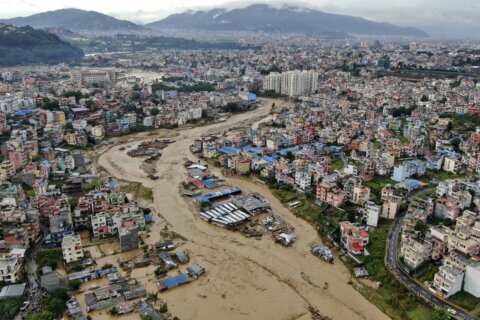In a year that witnessed a crackdown on civil liberties in Hong Kong, China has detained more journalists in 2020 than any other country, extending a role it assumed last year, two leading media rights groups say in studies published this week.
The reports, published on Tuesday by the Committee to Protect Journalists and on Monday by Reporters Without Borders (RSF), found Asia and the Middle East to be the most challenging regions of the world for journalists to operate freely.
According to RSF — Reporters Sans Frontieres, the organization’s original French name — the top five countries for imprisoning journalists in 2020 were China, Saudi Arabia, Egypt, Vietnam and Syria, which collectively accounted for 61% of the 387 journalists they had documented behind bars as of Dec. 1. RSF said at least 117 journalists were detained in China this year.
[SURVEY: 10 Countries Seen to Care the Most About Human Rights]
Meanwhile, CPJ reported a record number of detained journalists — 274, according to its report, adding that China, Turkey, Egypt and Saudi Arabia imprisoned journalists at the highest rates. Courtney Radsch, advocacy director for CPJ, said that her organization only reports instances where individuals were arrested in relation to their activities as journalists, perhaps resulting in a narrower overall count.
Officials from both organizations said the coronavirus pandemic even provided cover for some governments to more openly target the press in retaliation for critical COVID-19 coverage.
“Fourteen journalists were arrested in connection with coverage of the pandemic,” RSF Editor-in-Chief Pauline Ades-Mevel says, in response to what their governments called unfair or imprecise coverage. “The continent that is the most impacted is Asia. That’s the place where there are the most coronavirus(-related) detainees located.”
Radsch called 2020 “the worst year on record for journalists behind bars in retaliation for their work. … We’ve seen a backlash around the world against journalists reporting on the pandemic itself as well as government responses to the pandemic.”
[MORE: The 10 Most Corrupt Countries in the World, Ranked By Perception]
RSF reports two fewer journalists imprisoned this year than in 2019, while CPJ’s count broke a record set in 2016. RSF’s report also points out that arrests of female journalists in 2020 increased by 35% — 42 this year, compared to 31 in 2019 — and that the number of journalists arrested globally quadrupled from March to May 2020.
“There was curfew or confinement. The number of arrests (these months) has been three times bigger than the previous year,” Ades-Mevel says. “Without censorship from authorities, the Chinese media probably would have informed the world (about the coronavirus) ahead of time, possibly avoiding the pandemic.”
CPJ data indicates that journalists imprisoned on false news charges quadrupled from two to eight between 2013 and 2014, and has been growing in the double digits since 2015. “Globally, we saw a nearly 10% increase in the number of journalists jailed on false news charges,” Radsch says.
“COVID is a very convenient excuse to target journalists that regimes did not like before,” she says. Earlier this month the Guardian reported that Chinese citizen Zhang Zhan has been detained for six months because of her reporting on the coronavirus in Wuhan, believed to be the epicenter of the pandemic.
China earlier this year imposed a new national security law seen by critics as a way to curb dissent in Hong Kong and end the “one country, two systems” special autonomy the territory has enjoyed since the United Kingdom handed it over in 1997.
Several countries passed new laws aimed at countering fake news or disinformation this year. But press advocates warn that they were implemented at least in part to penalize journalists for critical coverage.
Ades-Mevel says that’s been true of Hungary, Serbia, Kosovo and Poland: “Authorities there have also been imprisoning journalists by passing harsher laws.” She says that the initial shock of the pandemic enabled governments to introduce more stringent laws that curtail press freedom.
This year, with the rampant spread of the coronavirus and widespread mobilizations for racial justice during the summer, the U.S. also engaged in some of the more aggressive tactics that repressive regimes employ against journalists.
“We did arrest several journalists during Black Lives Matter protests,” Radsch says. CPJ documented more than 900 press freedom violations, including many arrests and physical attacks on the press. “Conflation of protest and reporting with somehow committing a crime is something we see around the world,” she notes. “Anti-press rhetoric emanating from the White House has been resonating around the world.”
Ades-Mevel says her organization had been advocating for the release of Iranian journalist Rouhollah Zam, who was executed Saturday in Iran. Officials found Zam guilty of ” corruption on Earth.”
Radsch says that the unpunished murder of Washington Post columnist Jamal Khashoggi “has had a massive impact around the world in telling other countries that the U.S. is not going to hold others accountable for press freedom violations. I think the repercussions of that are still being felt.”
More from U.S. News
The 10 Countries That Care the Most About Human Rights, According to Perception
The 10 Most Corrupt Countries in the World, Ranked By Perception
The 25 Best Countries in the World
China Leads Countries Imprisoning Journalists, According to New Reports originally appeared on usnews.com







